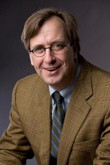PUBLISHER'S LETTER
From the Publisher

Tommy Bruce See larger image
Research universities like Cornell are exciting and vibrant places to be learning, researching and working these days. They enjoy the kind of technologies, facilities and teaching tools that were unheard of - indeed, even unimaginable - just a few decades ago.
But with these assets come enormous challenges. Cutting-edge technologies and infrastructures are expensive. Pursuing the promise of the Internet to deliver an educational experience equal to that of the classroom requires both institutional courage and investment. All this and much more is happening at a very dynamic time, when recruiting the faculty and hiring the staff of the future are a ballooning challenge as, inevitably, our baby boomers consider retirement.
This issue of Ezra introduces a four-part series of interviews with Cornell's deans to learn how they approach these and other issues facing their colleges and schools. We begin with CALS' Kathryn Boor, Johnson's Soumitra Dutta, ILR's Harry Katz and Human Ecology's Alan Mathios. All have views on their challenges that are perceptive, informed and replete with humanity.
What are their greatest challenges? An aging infrastructure, says one. Others point to limited resources and a small endowment, the budget challenges that face all of higher education and the lack of appreciation for "human capital as a competitive advantage to organizations and society."
But they are not doomsayers; all share the highest expectations for the future of education. On the timing of her college's recent entry into massive open online courses, Boor notes that "being the leader is fraught with risk, but being a quick follower is a smart strategy." Dutta views Johnson's future as deeply involved with society's big issues, "be it energy, sustainability, climate, inequality, jobs or poverty." Mathios sees his students increasingly entering key fields "like our focus on health and well-being, nutrition, policies that focus on families." And Katz sees the university doing more of what ILR is already doing: "Adult, continuous, life-long learning."
All four deans also reveal a personal side. "The truth is, I had no idea the job was going to be so much fun," says Boor. "The surprise for me was the pure joy" of alumni affairs and development, says Mathios. Katz continues to teach because "it's helped keep me sane." And Dutta talks about the values of family life.
The wisdom and aspirations of the people you will meet in this issue demonstrate that Cornell is heading in good directions.

Thomas W. Bruce
Vice President, University Communications
